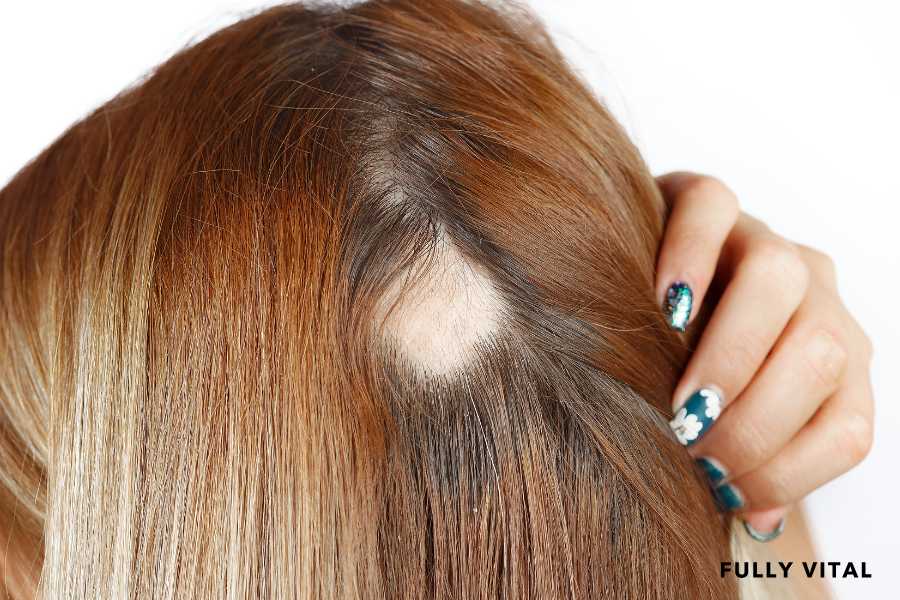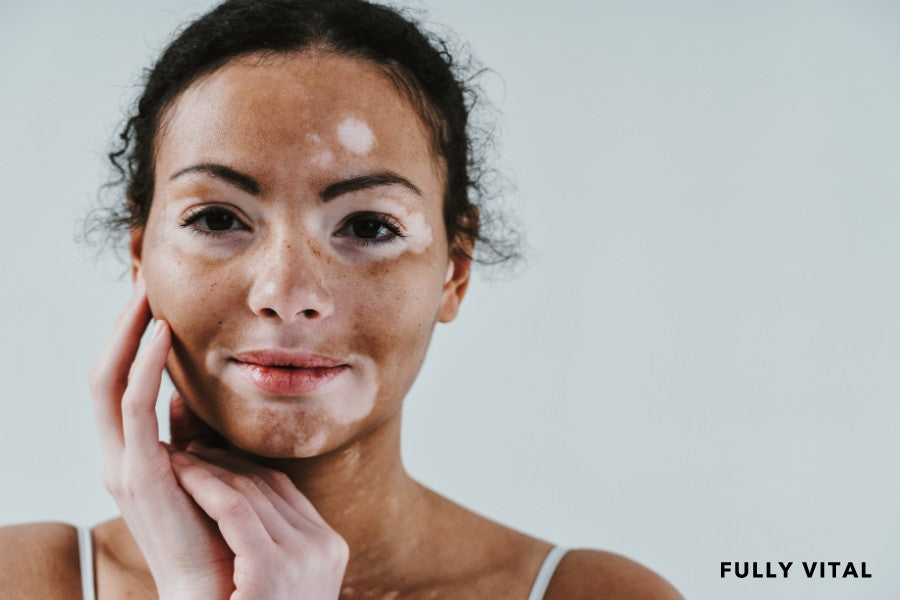
Preventing Alopecia Areata Spread: Effective Strategies And Insights
In the quest for luscious locks and vibrant hair, understanding how to prevent the spread of alopecia areata is crucial.
This article delves into insightful strategies aimed at stopping the progression of this condition, catering to women of all hair types who are eager to stimulate hair growth.
With a conversational tone, we'll cover the most pressing questions and offer valuable tips to maintain healthy and thriving hair.

I LOVE MY HAIR NOW
FullyVital hair serum and hair vitamins made tremendous improvements in my hair. I truly love my hair now.
Dorit S.,
How Can I Permanently Stop Alopecia Areata?
While achieving a complete and permanent stop to alopecia areata's progression might be challenging, there are strategies to effectively manage and control the condition:
Lifestyle Modifications
Implement a balanced diet, exercise routine, and stress management techniques.
A healthy lifestyle can contribute to hair health and overall well-being.
Medical Interventions
Consult a dermatologist for treatments like corticosteroid injections or topical applications.
These can help suppress the immune response and promote hair regrowth.
Immunomodulatory Treatments
Consider newer treatments targeting specific immune pathways.
These drugs show promise in managing the condition more effectively.
Hair Restoration
Explore options like hair transplants or microneedling for visible regrowth.
These techniques relocate hair follicles to bald patches.
Ongoing Care
Stay connected with a dermatologist for continual monitoring and adapting treatment plans as needed.

Stay Informed
Keep up with the latest advancements in alopecia areata treatment through reputable sources and healthcare professionals.
Mindset Shift
Focus on self-acceptance and support from loved ones.
Remember that hair loss doesn't define your identity.
How Does Alopecia Areata Differ From Other Types Of Hair Loss?
Alopecia areata stands out from other types of hair loss due to its distinct pattern of sudden, round or oval patches of hair loss caused by an immune system attacking hair follicles.
Unlike other types, like androgenetic alopecia, which is primarily genetic and hormone-driven, alopecia areata's hallmark is its unpredictable patchy hair loss and immune system involvement.
This autoimmune condition contrasts with the gradual, more defined hair thinning of other types of hair loss.1
Understanding Alopecia Areata
To tackle a problem, it's essential to understand it.
Alopecia areata is an autoimmune disorder that causes hair loss in distinct patches.
The body's immune system mistakenly attacks hair follicles, leading to their shrinkage and, eventually, hair loss.2
Factors Contributing To Spread
Various factors contribute to the spread of alopecia areata.
Genetics, stress, hormonal imbalances, and even certain illnesses can play a role in exacerbating the condition.
Recognizing these triggers is the first step toward effective management.
Effective Preventive Strategies
Managing alopecia areata requires a multi-faceted approach. Here are some strategies that can help prevent its spread:
Maintain A Healthy Lifestyle
A balanced lifestyle can positively impact hair health.
Regular exercise, sufficient sleep, and stress reduction techniques like yoga or meditation can make a difference.
Gentle Hair Care
Treat your hair with care.
Avoid harsh chemicals, excessive heat, and tight hairstyles that can stress hair follicles.
Topical Treatments
Consult a dermatologist for approved topical treatments like corticosteroids or minoxidil.
These can help promote hair regrowth and prevent further loss.
Nutrition Matters
A balanced diet rich in vitamins and minerals, especially biotin, zinc, and omega-fatty acids, can support healthy hair growth.
What Is Alopecia Areata?
Alopecia areata is an autoimmune disorder that leads to sudden hair loss in distinct patches.
It occurs when the body's immune system mistakenly attacks hair follicles, causing them to shrink and resulting in hair loss.
This condition can affect individuals of all ages and hair types, and its exact cause is not fully understood.

How Does Alopecia Areata Develop?
The development of alopecia areata involves the immune system targeting hair follicles as if they were foreign invaders.
This immune response disrupts the natural hair growth cycle, leading to hair loss. The condition often starts with small, round patches of hair loss on the scalp, which may gradually spread to other areas of the body.
In some cases, complete baldness (alopecia totalis) or loss of all body hair (alopecia universalis) can occur.
Why Is Alopecia Areata Treatment Important?
Treating alopecia areata is vital for several reasons.
Not only does it address the visible hair loss, but it also helps to prevent further spread of the condition.
Additionally, effective treatment can have positive effects on an individual's self-esteem and overall well-being, reducing the emotional impact of hair loss.3
Benefits Of Treating Alopecia Areata
When alopecia areata is treated promptly and effectively, several benefits can be achieved:
Restored Confidence
Successful treatment can lead to hair regrowth, boosting self-confidence and self-image.
Prevention Of Spread
Treating affected areas can help prevent the condition from spreading to new areas of the body.
Emotional Well-being
Managing hair loss can alleviate the emotional stress and anxiety that often accompany the condition.
Improved Quality Of Life
With regrown hair, individuals can resume their regular activities and interactions without the fear of stigma.
Personal Empowerment
Taking control of one's health by seeking treatment can empower individuals facing alopecia areata.
Alternatives To Alopecia Areata Treatment
While conventional treatments exist for alopecia areata, it's important to be aware of alternative options that some individuals consider:
Natural Remedies
Some people explore natural remedies like essential oils, herbal supplements, and dietary changes.
While evidence varies, these methods may support hair health for some individuals.
Wigs And Hairpieces
Wearing wigs or hairpieces can provide a cosmetic solution, especially for those not seeking medical treatments.
Camouflage Techniques
Cosmetics, such as hair fibers or scalp concealers, can help mask the appearance of hair loss.
Lifestyle Modifications
Lifestyle changes, including stress reduction, a balanced diet, and adequate sleep, can contribute to overall well-being and hair health.
History Of How To Stop Alopecia Areata From Spreading
-
Recognition Of The Condition: The identification of alopecia areata dates back centuries, with historical records mentioning sudden hair loss and its impact on individuals.
-
Early Treatment Approaches: Throughout history, various remedies and treatments have been attempted to manage alopecia areata, reflecting society's interest in finding solutions.
-
Advancements In Research: Over time, medical understanding of the condition has evolved, leading to more targeted treatment approaches and a growing emphasis on immune system involvement.
Current Environment
-
Advancements In Treatment: The present scenario witnesses a range of medical interventions and treatments for managing alopecia areata. Dermatology has made strides in immune-modulating therapies and topical treatments.
-
Rising Awareness: A heightened understanding of autoimmune conditions and increased awareness of alopecia areata's impact have spurred research, advocacy, and public support.
-
Integration Of Natural Solutions: Alongside conventional treatments, a growing interest in natural remedies has prompted the exploration of botanicals, supplements, and lifestyle modifications.
Future Of How To Stop Alopecia Areata From Spreading
Personalized Approaches
Advances in genetics and personalized medicine hold promise for tailoring treatments to individuals' genetic profiles, enhancing efficacy.
Innovations In Technology
Technology-driven solutions such as microneedling devices, laser therapy, and regenerative medicine are expected to reshape the treatment landscape.
Continued Research
Ongoing studies on immunomodulation, stem cell therapies, and gene editing indicate a promising trajectory for more effective and targeted interventions.
Unlock Vibrant Hair with Fully VitalExperience the transformation of your hair with Fully Vital's advanced hair growth products. Our mission is simple: empower you to regain a healthy, youthful relationship with your locks. Say goodbye to the signs of aging hair and welcome a new chapter of vitality and confidence. Discover The Power Of Fully Vital:
With Fully Vital, you're not just using products – you're embarking on a journey to rediscover the beauty and vitality of your hair. Welcome to the future of hair care, where aging gracefully is a reality. |
Final Thoughts On How To Stop Alopecia Areata From Spreading
In the journey to understand how to prevent the spread of alopecia areata, we've explored the intricate details of this condition, its underlying causes, and the strategies to manage it effectively.
From grasping the immune system's role to uncovering the benefits of treatment, our goal has been to equip you with insights that empower you to make informed decisions about your hair health.
As we reflect on the historical context, current advancements, and future possibilities in addressing alopecia areata, one thing is clear: the landscape of hair care is evolving.
With an increased understanding of the condition, the integration of innovative technologies, and a deeper commitment to personalized solutions, the path toward healthier, more vibrant hair is being paved.
At Fully Vital, we're dedicated to supporting your journey toward a more enriching relationship with your locks.
Our range of hair growth products is designed to halt the signs of aging in your hair, fostering a sense of vitality and confidence.
As you embark on your personal hair care journey, remember that knowledge and proactive choices are your greatest allies.
Take charge of your hair health today and embrace a future where your locks thrive with vitality.
Frequently Asked Questions About How To Stop Alopecia Areata From Spreading
Will using hair products worsen the condition?
Harsh chemicals and excessive styling can stress hair follicles.
Opt for gentle, natural hair care products and avoid over-styling.
Can stress really worsen alopecia areata?
Stress can trigger or exacerbate alopecia areata in susceptible individuals.
Managing stress through relaxation techniques can have a positive impact.
Are there any specific foods that can help prevent its spread?
Yes, foods rich in biotin (such as eggs and nuts), antioxidants (like berries), and omega-3 fatty acids (found in fish) can support hair health.
Is alopecia areata hereditary?
Genetics play a role, so if a close family member has it, your risk may be higher. However, it's not the sole determining factor.
Can I use over-the-counter treatments without a doctor's advice?
Consult a dermatologist before using any treatments.
They can recommend the most suitable options based on your condition.
Are there any alternative therapies worth trying?
While some alternative therapies are marketed, scientific evidence varies.
Consult a healthcare professional before trying any alternative treatments.
Can I color or dye my hair if I have alopecia areata?
It's best to consult a dermatologist before using hair dyes or colorants to ensure they won't exacerbate the condition.
How soon should I seek professional help after noticing symptoms?
The sooner you seek help, the better.
Prompt intervention can help manage the condition and prevent its spread.
Is surgical intervention an option?
In some cases, hair transplant surgery might be considered.
Consult a specialist to determine if it's suitable for your situation.
Are there any specific habits to avoid?
Avoiding excessive hair pulling, tight hairstyles, and over-processing your hair can reduce stress on hair follicles.
Sources:
-
NIAMS. (2019). Alopecia Areata. National Institute of Arthritis and Musculoskeletal and Skin Diseases. https://www.niams.nih.gov/health-topics/alopecia-areata
-
Alopecia areata: Who gets and causes. (n.d.). Www.aad.org. https://www.aad.org/public/diseases/hair-loss/types/alopecia/causes
-
American Academy of Dermatology Association. (n.d.). Alopecia areata: Diagnosis and treatment. Www.aad.org. https://www.aad.org/public/diseases/hair-loss/types/alopecia/treatment







